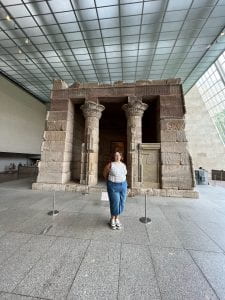Elizabeth Vazquez

Please provide a brief summary of your research.
My archival research followed a survey of Indigenous Intellectuals in Chicago around the turn of the 20th century, more specifically Simon Pokagon (Pokagon Band Potawatomi) to William Jones (Meskwaki), a linguistic anthropologist. Particularly, I was interested in their entanglements as emblematic of two different generations of Indigenous Intellectuals. I ultimately wanted to ground them in the literal space of the Chicagoland area, so I used old maps in cross reference with their writings to place them in their specific Chicago eras. I read through their main written sources, and ended up focusing more on William Jones to produce a public-facing essay tracing different portrayals of Jones, ranging from his personal letters to a biography written by a friend. Jones is particularly significant because he was the first Indigenous person to receive an anthropology PhD, and worked as a curator in the Field Museum in the early 20th century.
What made you initially interested in researching your project in particular?
I was born and raised in Chicago, so the Field Museum is a place very near to my heart. So many memories were made in my childhood in its winding halls of taxidermy, fossils, and artifacts. However, growing up means learning more, and that ultimately meant learning more about the ways the Field Museum has participated in colonial projects like most American educational institutions. I started with this larger project to grapple more with the Field’s history, and slowly narrowed down to the individual stories within the Field that went against the grain of the time. Now, when I go to the Field, I can make connections across time to people who are part of the Museum’s history.
What made you interested in pursuing (interdisciplinary) research more broadly?
I’m a lover of storytelling, and archival historical research allows for that. I wanted to find people in the archive and become a platform for their stories, hopefully upsetting general assumptions about history. In the case of my research, the idea of an Indigenous man working in a nearly all-white space infamous for creating caricatures of Indigenous people goes against general assumptions of what was happening inside of the Museum. These stories subvert ideas about Indigenous people, such as their only place in Museums as being on display, and refocuses on truth. Even beyond my specific projects, I want to hear these stories, either from oral retellings or by piecing together findings in archives. I want to remember that the names in history at large were people first and foremost before anything else.
Describe your experiences with research thus far. Was it tricky? What skills do you think you’ve gained?
Before my SURG, I did an archival URAP that was more about coding data over large swaths of journals. This however was more my jam. Overall, I loved the experience. I took my time and fell down rabbit holes, and came out with a really cohesive story about someone who not many people know about. The biggest issue I faced during archival research was that one of my subjects, William Jones, had absolutely terrible handwriting. Transcription of cursive is definitely the best skill I’ve gained from last summer.
Any tips or advice you have for students similar to you that are interested in pursuing undergraduate research?
If you have an interest or a passion, talk about it! Ask the faculty you know to find Northwestern’s expert on it. Tell your friends about what you’re thinking (if they’re good friends, they’ll listen). Amazing things can happen when you have these conversations.
Do you have a podcast/documentary/piece of shareable media related to your research?
https://storymaps.arcgis.com/stories/4fb71bd68c524f13ab5a926cbf33f856. This essay is part of a larger project by Professor Kelly Wisecup of the English department.
If you had unlimited time, money, resources, support, etc. what is something you would research?
I’d want to try to learn as much as I can about Hercules, Washington’s enslaved chef who escaped, possibly expanding the project to cover other enslaved chefs of pivotal early American figures.
What is your go-to phrase to yell during the finals “Primal Scream”?
[unintelligible rage noises]
What’s the most interesting thing you’ve learned/read about/listened to this week?
Marscapone, hazelnut, and espresso make for ridiculous cookie add-ins.
What is your most useless talent?
When I unfocus my eyes, I look like a lizard.
